RB Leipzig erupted into the Bundesliga and caught the world’s attention. The East German club gained promotion through big spending as is commonly done by the vast majority of new European superpowers but the club took an interesting route towards signing players. Instead of seeking out experienced players, Leipzig opted to sign young, up-and-coming talents to power them through promotion. After achieving their goal of reaching the Bundesliga they were in search for a new talisman to partner Yussuf Poulsen and eventually landed the prodigious talent, Timo Werner.
The German striker started his career with Stuttgart and first featured for the club in the 2013/14 season in a Europa League qualifier coming on as a substitute. He initially started out as a right-winger and became the youngest player to play for Stuttgart. After impressing in his first few games, Werner continued to play and keep his place in the squad.
Over the next two seasons, he was used as a right-winger because of his incredible pace, agility and willingness to take on isolate defenders, usually getting the better of them. Werner has encountered his fair share of struggles early on when he failed to register a single goal or assist in the between November and May of the 2014/15 season albeit having only played a handful of minutes every week. The young forward was struggling to find consistency and rhythm in attack.
Turning point
The manager at the time was Huub Stevens who was replaced by Alexander Zorniger. The new coach immediately declared his expectations from Timo Werner acknowledging his talents but he needed to work harder. Zorniger shifted Werner into a centre-forward role with the winger struggling to adapt at first.
However, four straight defeats caused havoc and disharmony between the coach and player. He failed to replicate the type of form and play style he showed in his natural right-wing position and he ended the campaign with six goals from 26 appearances resulting in Stuttgart’s relegation from the Bundesliga. Werner’s time at the club was coming to an end and he needed an escape route.
Enter RB Leipzig, who were promoted to the Bundesliga and were in search of a talented striker. They purchased Timo Werner for an estimated €10m and gave the German a new lease of life and started to build a team around Werner supplemented by other young talented stars.
The rest is history, we’ve seen Timo Werner set alight the Bundesliga with his electric pace and high-octane pressing and even making his international debut after proving his exploits with the East German club. In this article, we will examine Timo Werner’s strengths and weaknesses and what qualities he brings to RB Leipzig and the Bundesliga.
The Leipzig way
RB Leipzig’s primary strategy involves centre-backs launching long balls towards Yussuf Poulsen or build up play from the wing-backs. The old-fashioned target-man was limited in function; their only contribution would come through their hold up play and heading but the modern-day centre-forward needs to have an all-around skill set to stay relevant, especially given the modern manager’s preference to play with a single striker.
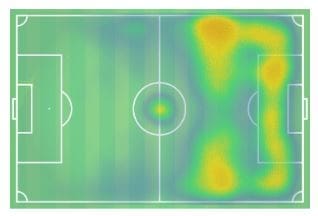
Long balls from the centre-backs or crosses from out wide, Leipzig try to keep the opposition guessing. Lucas Klostermann, Marcel Halstenberg, Nordi Mukiele, and Marcelo Saracchi are first-choice options for Ralf Rangnick and are vital to Leipzig’s style of play. Even Kevin Kampl and Marcel Sabitzer play the Mezzala role when Rangnick needs play to be stretched, moving out wide and supplying crosses for the strikers.
Creating connections
Timo Werner’s strongest capability is his ability to link up with the players around him. Playing as a right-winger early on in his career made him a rather selfish player due to his preference in getting to the byline isolating him with the opposition full-back. The transition to the centre-forward position and playing in a two-man striker system has made Werner learn to link up with his strike partner. He’s understood his strengths as a centre-forward and how to become a more effective player.
Yussuf Poulsen hold-up play is excellent and thrives on runners moving in behind defenders with blistering pace by running onto the second balls. Timo Werner prefers to drift into the channels and play within the pockets of space. Poulsen’s presence as the focal point gives him the freedom to drift out wide and make darting runs into the penalty area. He will often be seen dropping deep to receive a ball from midfield trio to lay off to Poulsen or one of the other Leipzig attackers.
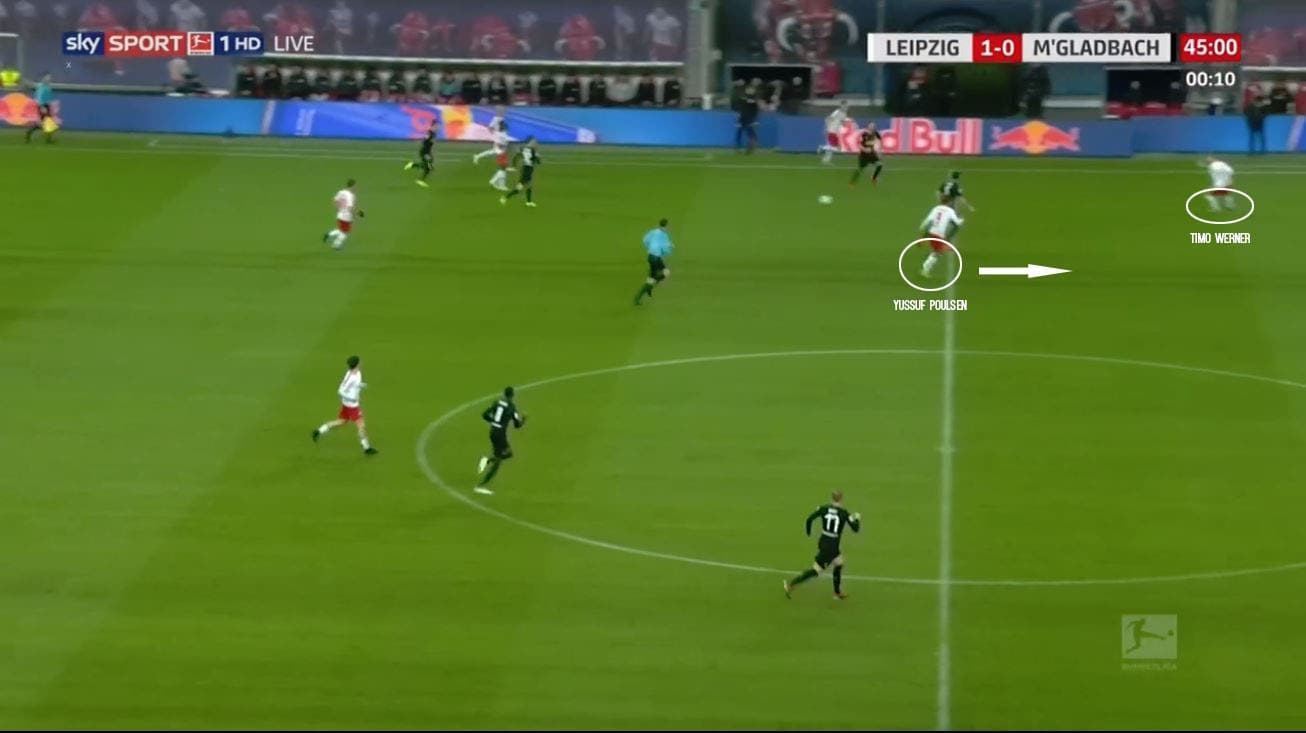
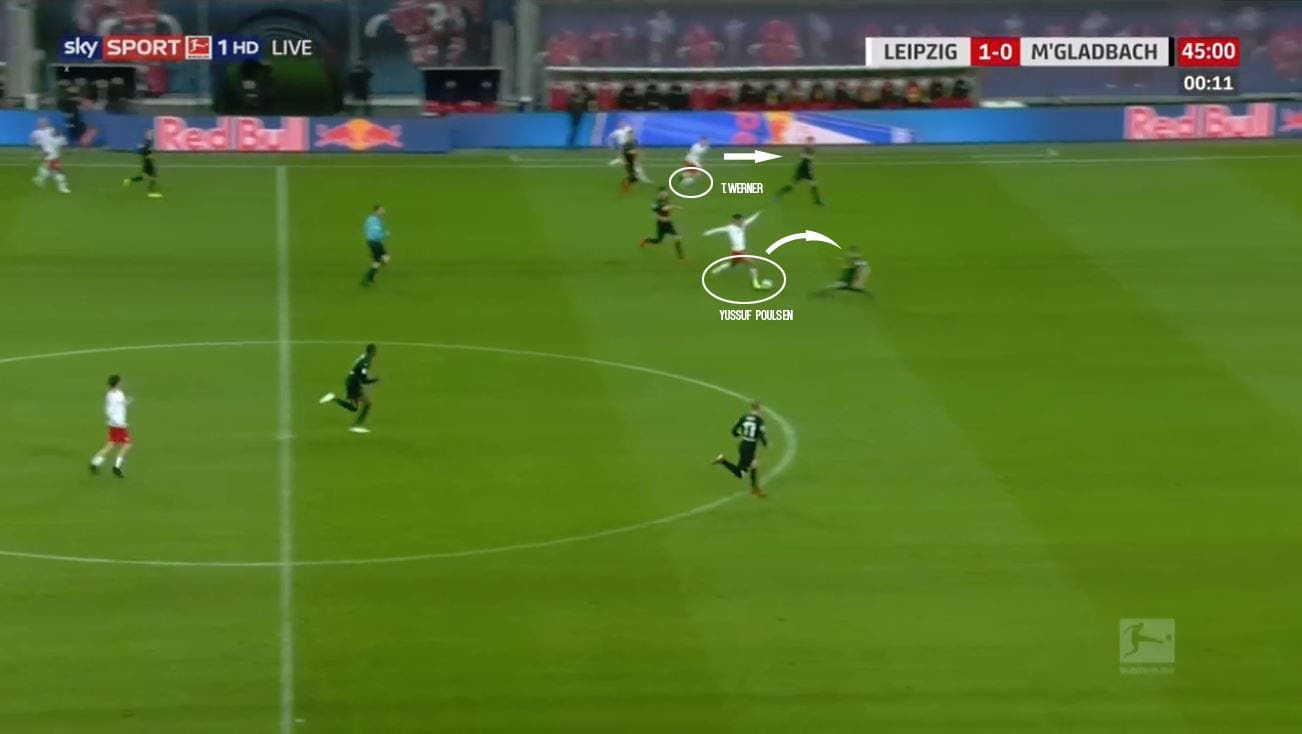
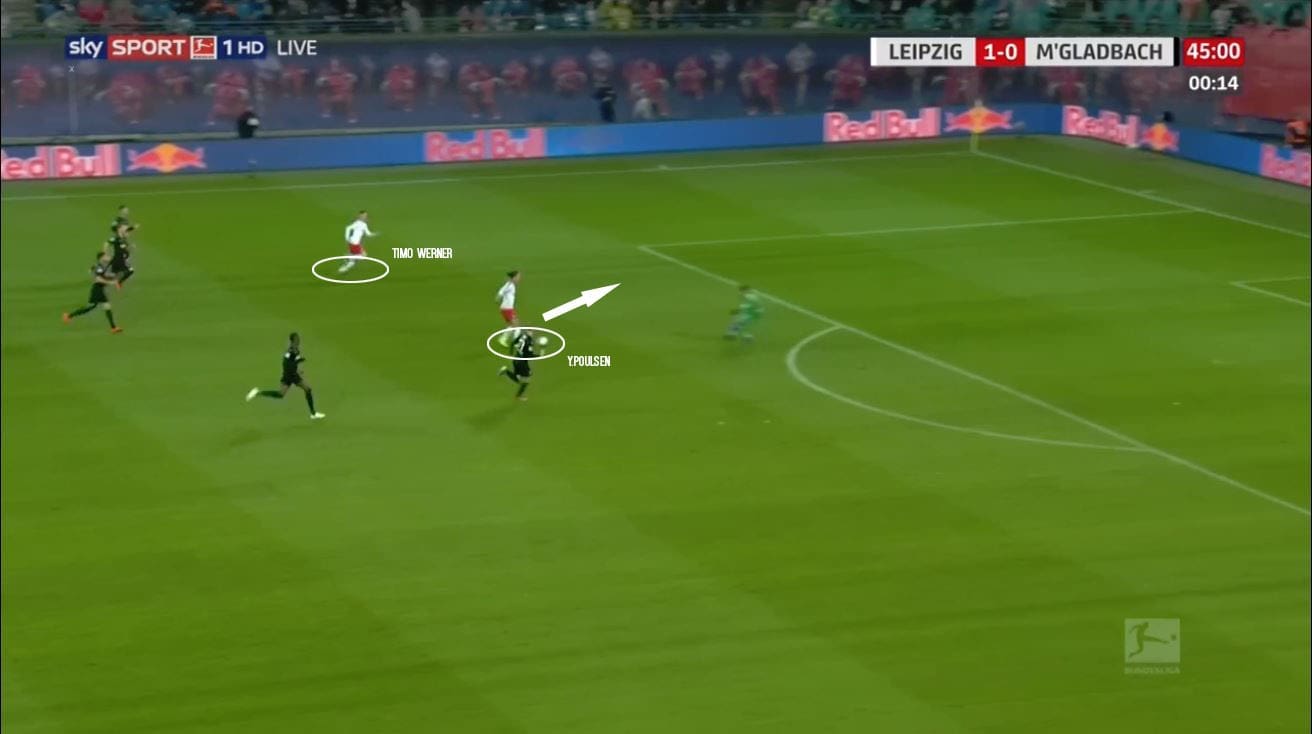
In this example against Borussia Mönchengladbach, notice the threaded ball played towards Timo Werner with his back to goal. Poulsen’s movement is towards goal and Werner’s first instinct is to play his strike partner in and cause confusion amongst the opposition’s defenders. As Poulsen receives the ball, Werner makes a quick sprint through the defensive line gambling on Poulsen’s ability to bypass the onrushing defender. Having successfully avoided the challenge; Poulsen is one on one with the Gladbach goalkeeper and decides to finish the move by laying off a simple ball towards Werner who finishes neatly.
Incremental improvements
In his early career, Werner’s passing was seen as a weakness, especially given his style of play as a right-winger. He was an adept crosser but his passing and vision needed more development. Since his transformation into a centre-forward, Werner’s all-around ability has vastly improved. Instead of being a pure finisher or link up player, the German has developed the ability to bring his teammates into play. He knows when to drop into midfield and when to stay on the shoulder, these movements have become second nature.
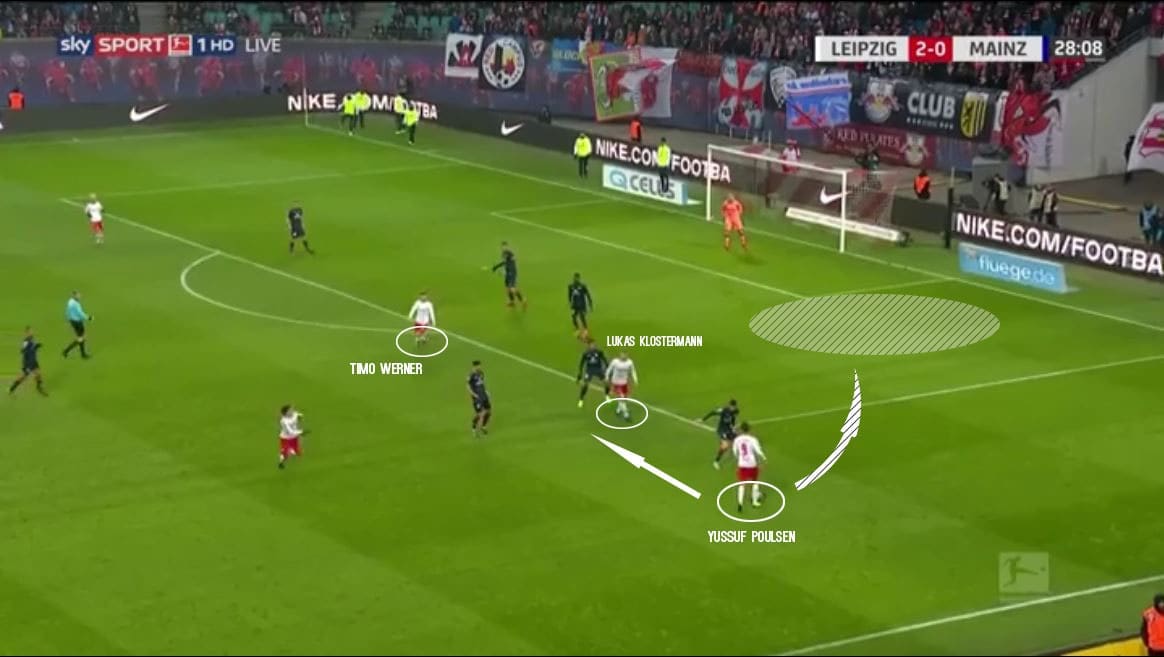
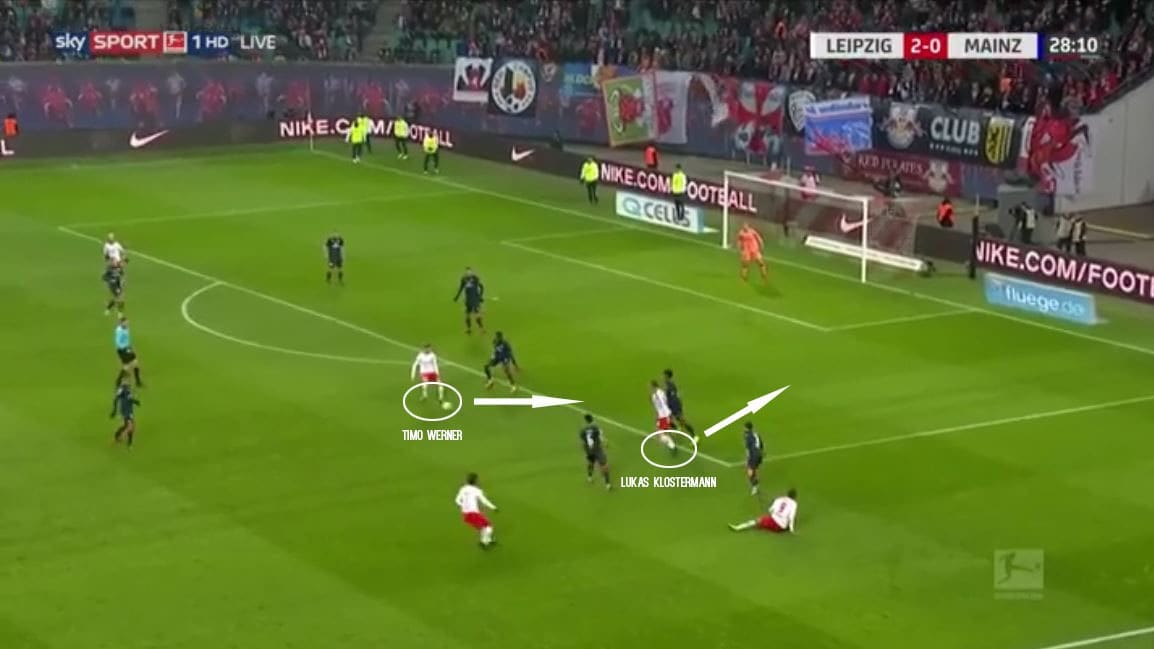
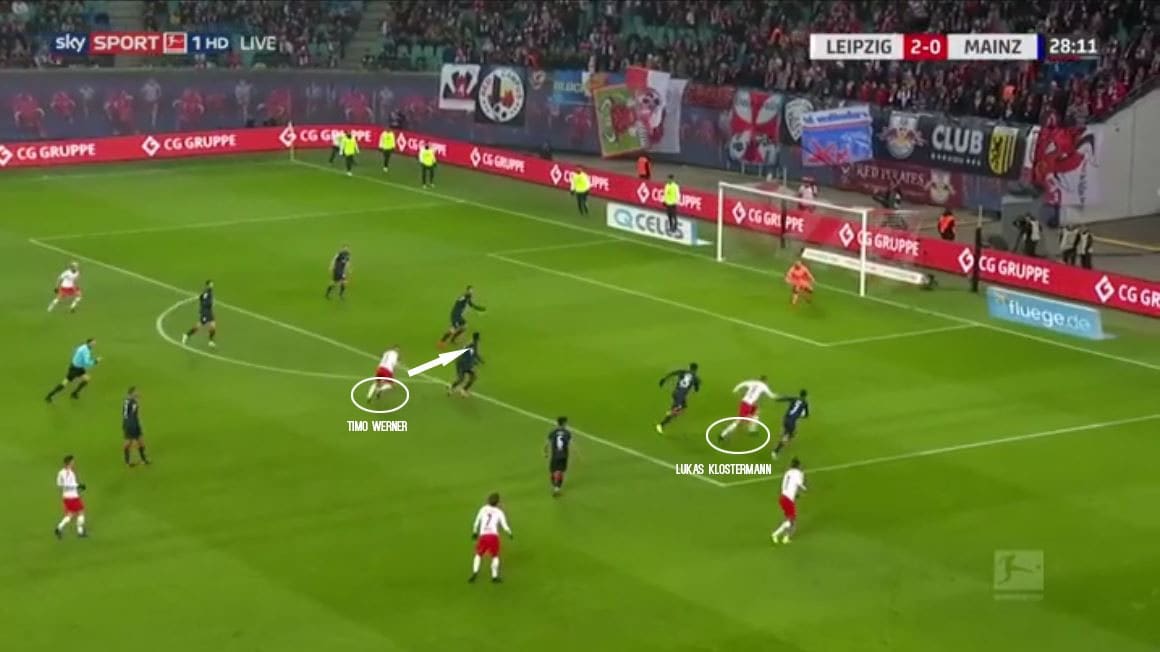
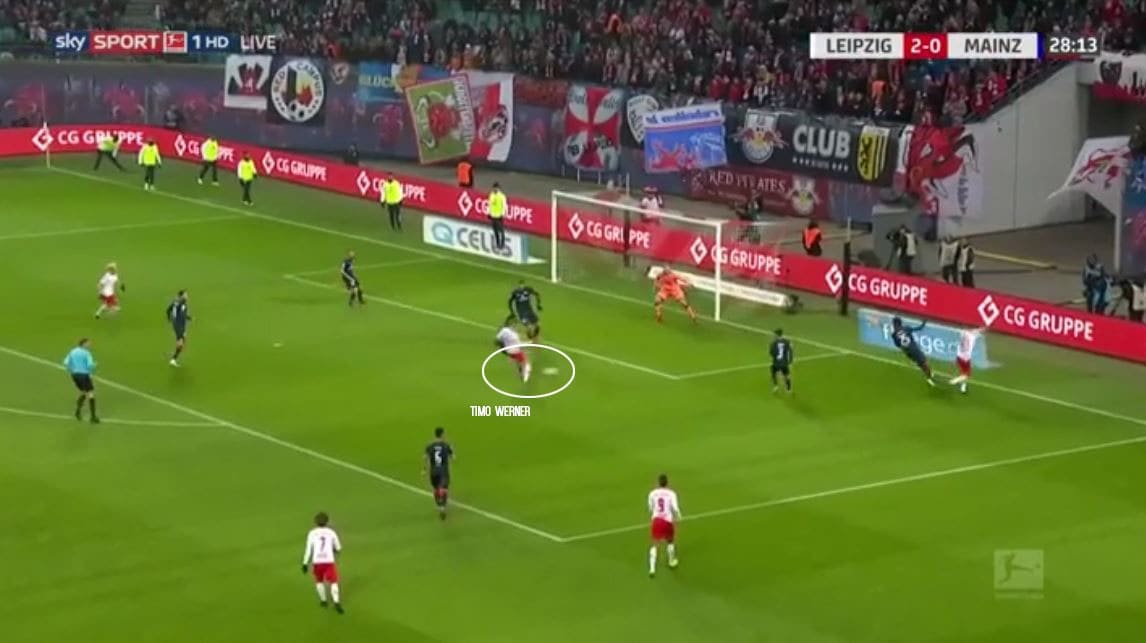
Here, we can see Werner positioned on the edge the penalty box scanning the different options available to him. There is a gap behind Lucas Klostermann that Leipzig wants to exploit but Poulsen playing a pass around his marker for Klostermann could result in a loss of possession. Instead, the Danish striker intelligently plays a pass towards Timo Werner who in turn plays a quick through-ball to Klostermann. Werner attempts to find space in the box with the centre-backs now fixated on blocking Klostermann’s delivery. Although Werner was not able to get his shot on target, his pin-point pass unlocked the Mainz defensive line.
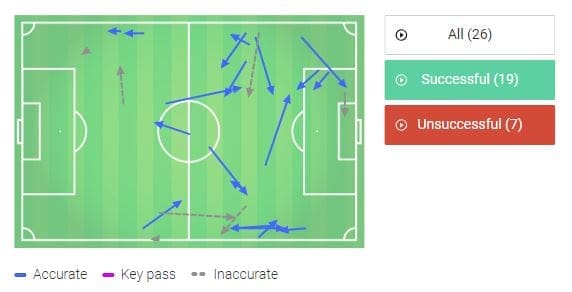
Timo Werner’s direct dribbling is a direct result of his tenure as a right-winger. Combine this with his vision and passing, it is little wonder how he manages to score and assist to a number of goals. He keeps the ball close to his feet allowing him better control and a wide range of passing choices, whether it be a long pass on the counter-attack or a nifty through ball through a crowd of bodies.
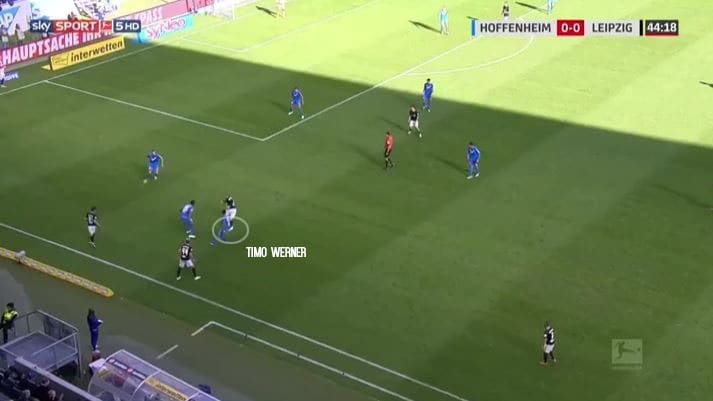
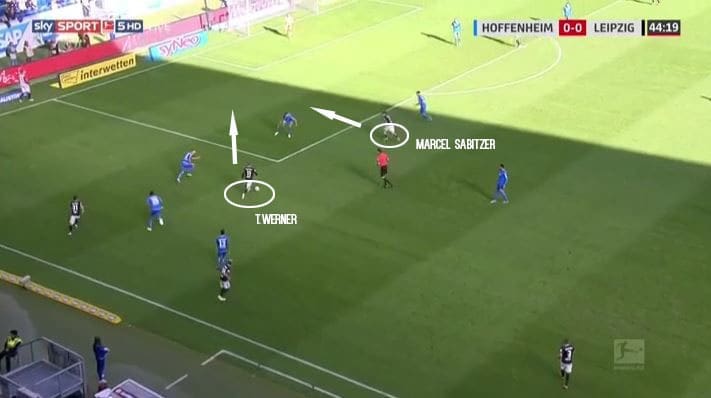
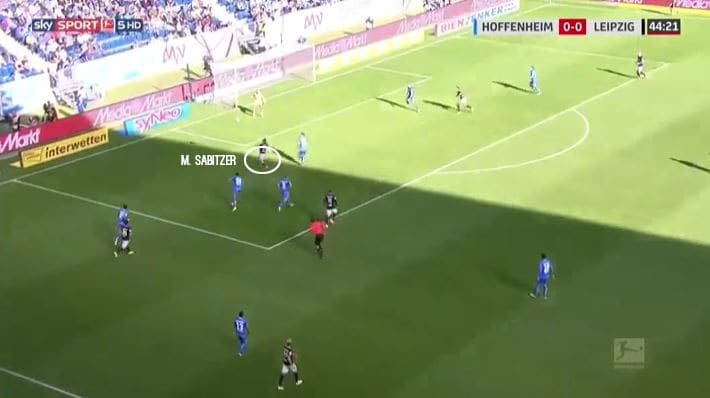
Against Hoffenheim, Werner is cornered by three defenders but his intelligence and vision see Marcel Sabitzer’s intention. As he skips past the defender, Werner anticipates Sabitzer’s movement but instead of slotting a through-ball along the pitch, he innovates and lobs a wonderful ball over to the Austrian. This one pass catches Hoffenheim off guard and splits the defence.
A match made in Leipzig
Effective striking partnerships have seen teams win multiple league titles and championships and Timo Werner has successfully created an alliance with Danish striker Yussuf Poulsen. The two have been an ever-present force for RB Leipzig since Werner’s move from Stuttgart in 2015.
“It’s great for me with him up front. We complement each other really well. He likes going for aerial challenges, which I don’t. He’s got an amazing set of lungs.” – Timo Werner
Timo Werner plays the buzzing and energetic role of the two strikers. Once the ball is played into Poulsen his preference is to find Werner and play him through. Both players have an uncanny habit of finding each other and have the ability to find open spaces. Through pace, strength or intelligence both players find a way to score.
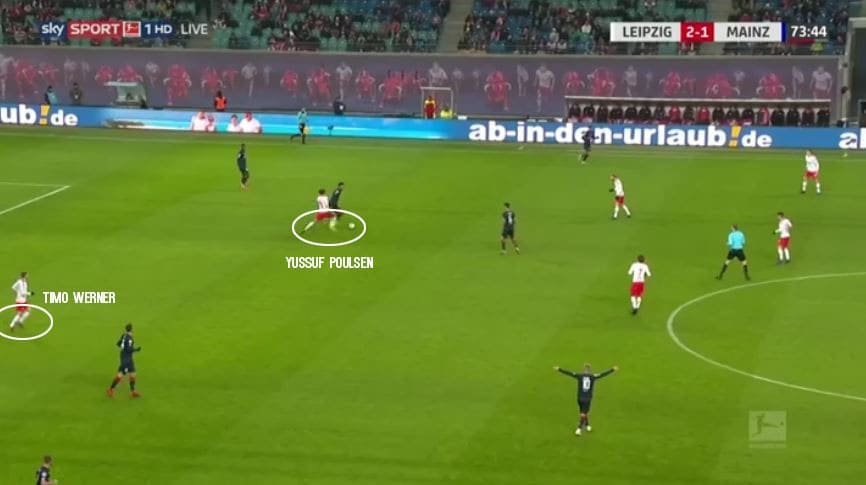
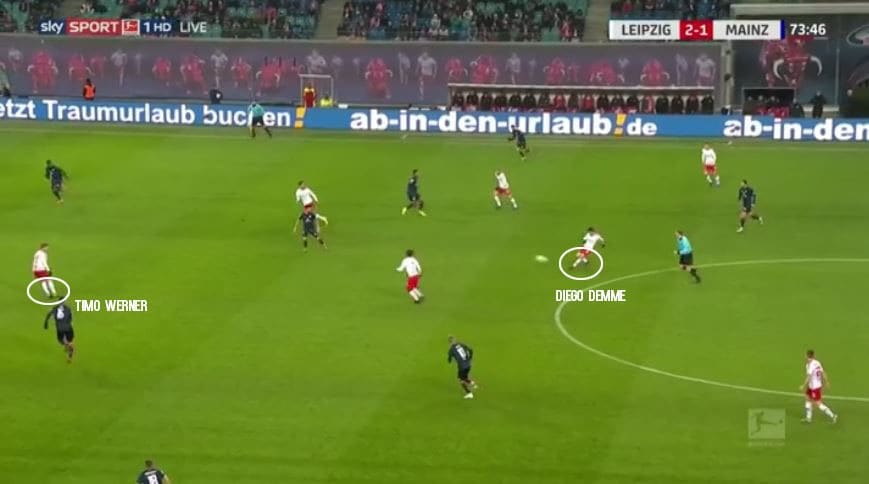
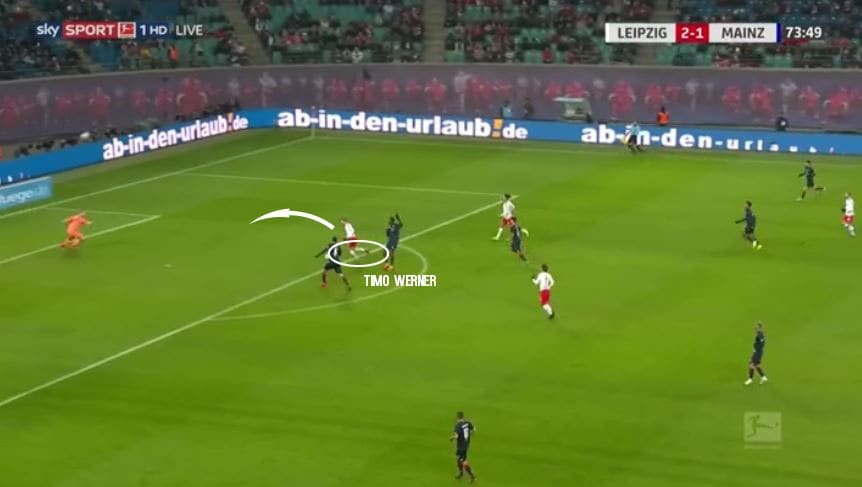
The plaudits may go to Werner but the goal only came about because of Poulsen’s pressing, which was the origin of the goal. Poulsen’s pressure causes the Mainz defender to lose the ball and misplaces a pass to Diego Demme allows him to play in Timo Werner who scores.
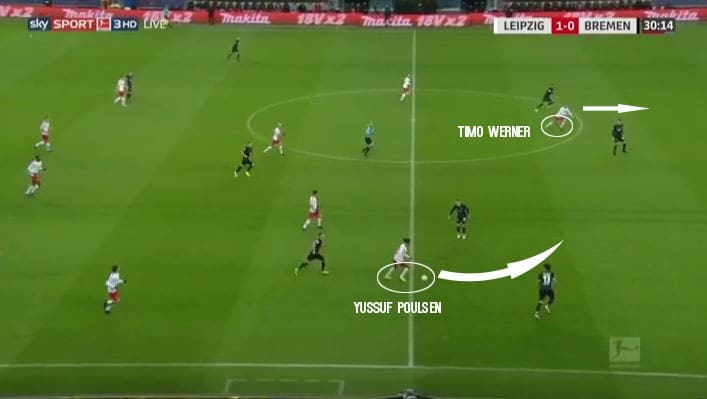
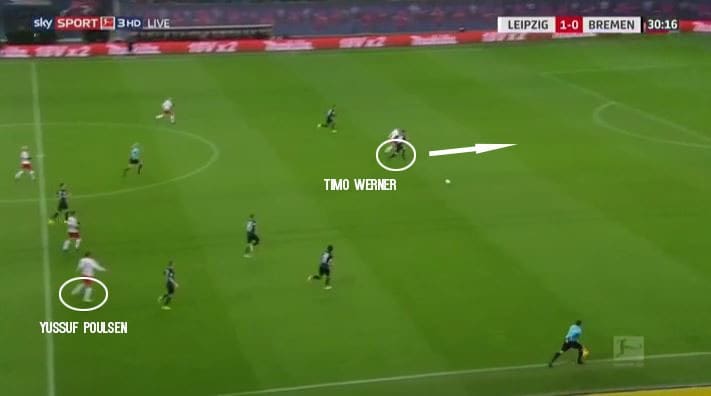
Another example of their fruitful partnership is exemplified here with Poulsen picking up the ball in central midfield and starts his forward run. He already knows Werner’s position and picks out a wonderful pass out to Werner who gets into a one-v-one opportunity against the Werder Bremen goalkeeper.
The curious case of Timo Werner
While goals have typified Timo Werner at RB Leipzig, the same cannot be said about his tenure with the German national team. One of the biggest complaints against the striker is his ineffectiveness against the international sides and failure to consistently lead the line.
After moving to Leipzig, Werner did enough to earn a call-up to the national side and is trying to fill in the boots of the legendary Miroslav Klose. Since the retirement of Miroslav Klose and the inconsistent form of Mario Gomez, with Joachim Löw has been searching high and wide for a new man to lead the line and Werner seems to be pinpointed as the future.
Germany endured a forgettable 2018 World Cup, with the team performing well below-par. The then-defending-champions were expected to reach the final four if not defend their crown but poor performances early in the group stages sealed their early exit. Timo Werner was blamed for not providing any serious venom to a toothless attack but one of the major reasons for Werner’s failures at international level does lay in the system.
At Leipzig, Werner is accustomed to playing in a two-man striking system and is more comfortable playing off a target man rather than leading the line on his own. He has the capability to play as a solo striker with his dribbling and link up play but he cannot be left isolated as he thrives on players being in and around him. Werner would excel under the likes of Pep Guardiola or Jürgen Klopp who both like playing with their attackers in close to each other.
The Crown Jewel
Timo Werner has blossomed into a top striker since his move to RB Leipzig and is destined for greater heights. A move to one of Europe’s elite clubs has been mooted over the past year and with his recent contract dispute, the rumour mill has gone into overdrive.
However, this doesn’t take away from Werner’s innate talent and ability to score goals and be Leipzig’s talisman. His link-up play and partnership with Yussuf Poulsen is a particular highlight and having been linked with a move to Bayern Munich, Borussia Dortmund, Liverpool and Chelsea, this change may be the stepping stone he requires to truly become a world-class centre-forward and realise his true potential. The Bavarian club is amidst a squad overhaul and wants Werner to be the crown jewel joining the likes of Benjamin Pavard and possibly Callum Hudson-Odoi and Lucas Hernandez in a new look squad.
If you love tactical analysis, then you’ll love the digital magazines from totalfootballanalysis.com – a guaranteed 100+ pages of pure tactical analysis covering topics from the Premier League, Serie A, La Liga, Bundesliga and many, many more. Get your copy of the FIRST of two December issues for just ₤4.99 here, or the SECOND of the December issues with an annual membership right here. Alternatively, you can pre-order the January issue NOW! It lands on Friday 18 January.

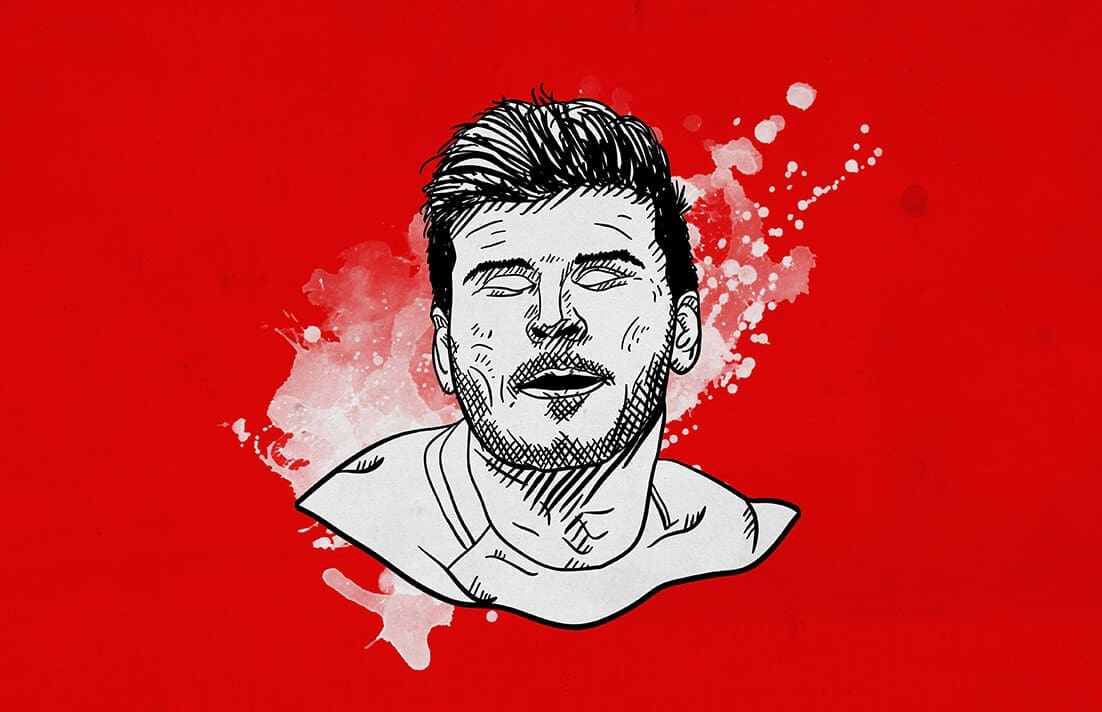

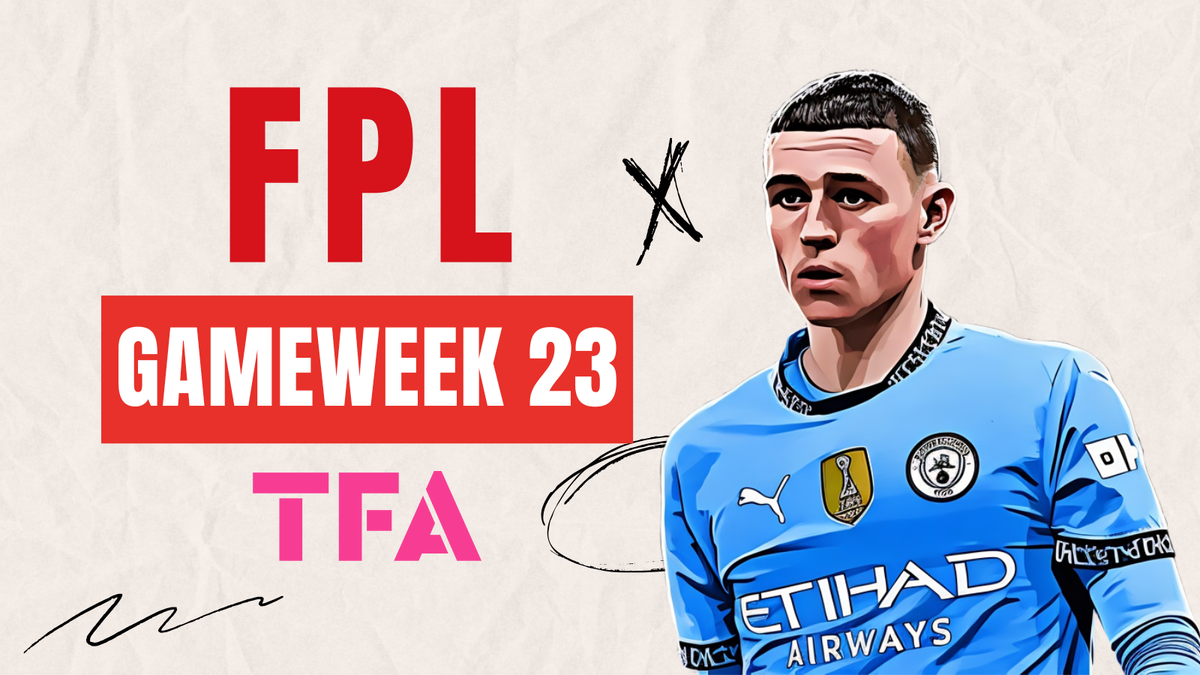
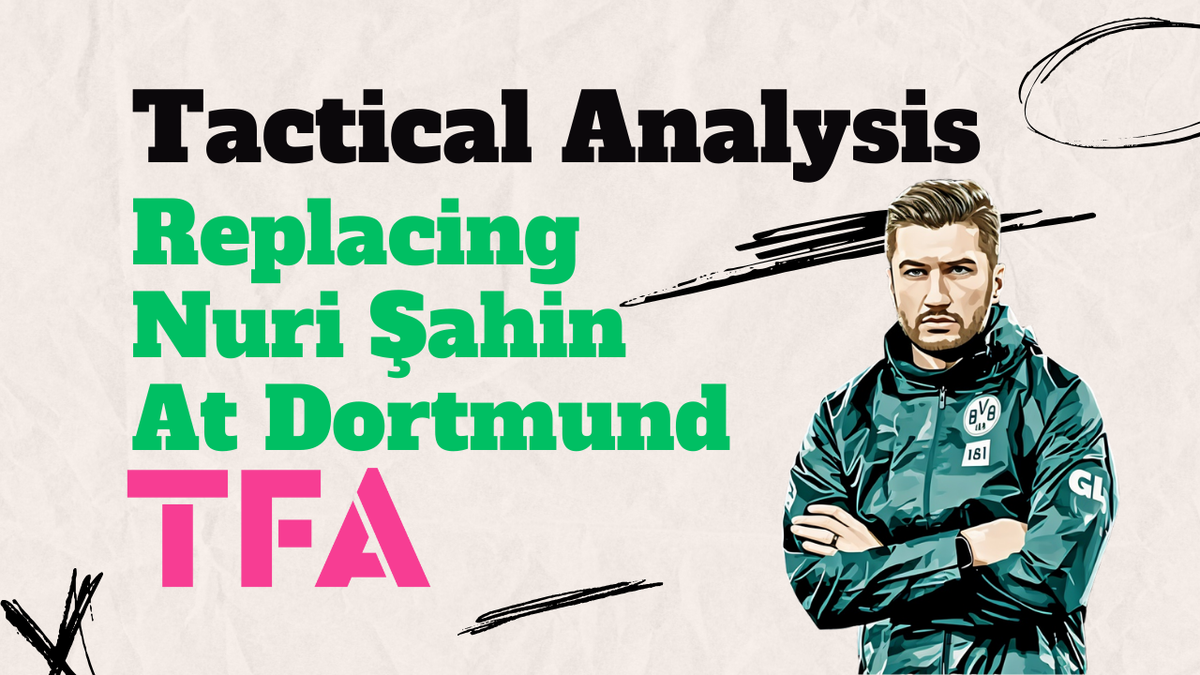
Comments